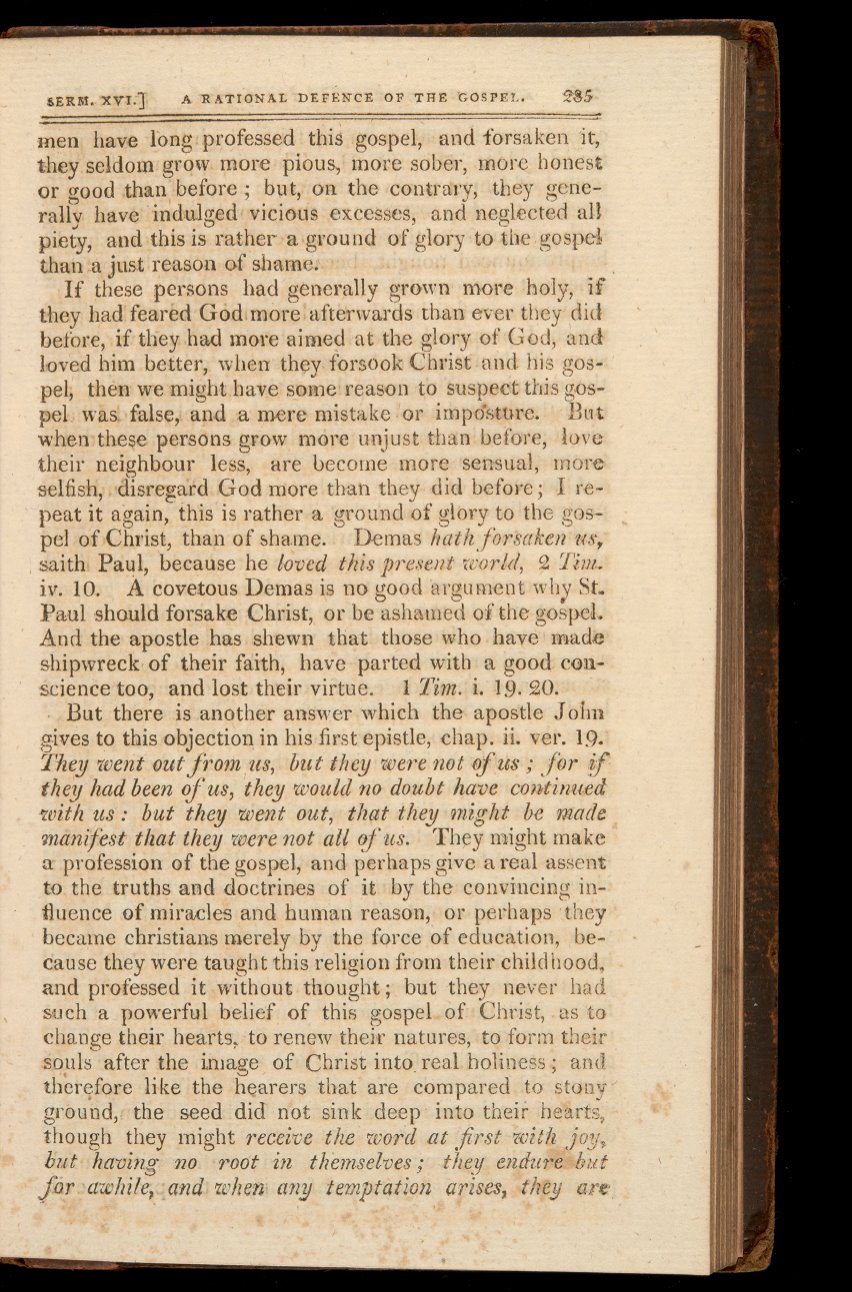

SEEM.
%VI.]
A
RATIONAL DEFENCE
OF
TAE
GOSPEL.
Zg5..
men have
long
professed this
gospel,
and forsaken
'it,
.
they
seldom grow
more
pious,
more
sober,
more
honest
or
good
than
before
;
but,
on the contrary, they
gene-
rally have indulged vicious
excesses,
and neglected all
piety, and this
is
rather
aground
of
glory to
the
.gospel
than
a
just
reason of
shame.
If
these
persons had generally
grown more
holy,
if
they
had
feared
God
.more
afterwards than ever
they
did
before,
if
they had more aimed
at the
glory
of
God,
and
loved him
better,
when they forsook
Christ
and
his
gos-
pel,
then
we
might
have
some
reason
to
suspect
this
os-
pel
was.
false,
and
.a
mere mistake or imposture. But
when these
persons
grow
more unjust than
before,
lave
their
neighbour
less,
are
become more sensual,
more
selfish,
.
disregard
God
more
than they did before;
I
re-
peat it
again,
this
is
rather
a ground
of
glory
to the gos-
pel
of
Christ, than
of
shame.
Demas
bath forsaken
us,
saith
Paul,
because he
loved
this
present
world,
2
Tim.
iv.
10.
A covetous Demas
is
no
good
argument
why
St.
Paul
should forsake Christ,
or
be
ashamed
of
the
gospel.
And the apostle
has shewn
that
those
who
have made
shipwreck of their
faith,
have
parted
with
a
good.
con-
science
too,
and lost
their
virtue.
1
Tim.
i.
19.
20.
But there
is
another
answer which
the
apostle
John
gives to
this objection in
his first epistle,
chap.
ii.
ver.
19.
They
went out
from
us,
but
they were
not
of
us
;
fr
:f
they
had
been
of
us,
they would
no
doubt have
co»tinued
with
us
:
but
they went out,
that
they
might
be
made
manifest
that
they were
not
all
of
us.
They
might make
a
profession
of
the
gospel,
and perhaps
give
a real assent
to the
truths
and doctrines of it
by
the
convincing
in-
fluence
of
miracles and human
reason,
or perhaps 'they
became christians merely
by
the force
of
education,
be-
cause they were
taught
this
religion
from
their
childhood,
and
professed
it without
thought;
but
they never had
such
a
powerful
belief
of
this gospel
of
Christ,
as
to
change
their hearts,
to renew
their natures, to
form
their
souls
after the
image
of
Christ
into,
real
holiness
;
and
therefore
like the hearers
that
are compared
to stony
ground,
the
seed
did
not
sink
deep into their hearts,
though
they
might
receive
the word
at
first
with joy,
but
having
no
root
in
themselves; they endure
hut
for
'awhile,
_and
when
any
temptation
arises, they
are

















